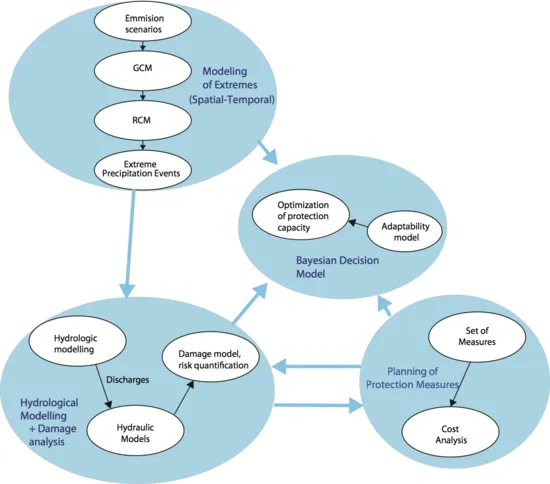AdaptRisk: Climate Adaptation of infrastructure systems
Infrastructure, such as for example the flood protection measures, typically has life time of decades, if not centuries. Climate projections, rainfall statistics etc. on the other hand are constantly changing as they are subject to considerable uncertainty. Correspondingly, it may be sensible to prefer adaptive infrastructure in the decision making process as the requirements are likely to change as new evidence arises.
AdaptRisk is a collaborative project of the ERA Group and the Chair of Hydrology at TUM. It is the aim of this project to develop a methodological framework of decision making under uncertainty that allows taking into account the adaptability of the infrastructure. In contrast to previous projects, the analysis is performed fully quantitatively, based on rigorous mathematical modeling of the uncertainties and Bayesian decision analysis for assessing the optimality of risk mitigation strategies. In particular, we are looking at uncertainty introduced by climate change and its implication for planning of flood protection measures. The Chair of Hydrology focuses on the hydrological modelling of the flood protection measures, on the required model complexity and categorization of the flood protection measures.
While many of the aspects of our work lie in basic research, we strive to make our findings applicable. We are cooperating with the Bayerisches Landesamt für Umwelt and other partners on the implementation of the framework to real case studies. Our focus lies on the city of Rosenheim and Kolbermoor, which are located at the outlet of the Mangfall River into the Inn River.

Researchers
- Beatrice Dittes
- Maria Kaiser
- Olga Špačková
- Daniel Straub
- Markus Disse
- Claudia Klüppelberg
- Anke Scherb
Funding
Collaborations
- Landesamt für Umwelt, Bayern
- Wasserwirtschaftsamt Rosenheim, Bayern
- Chair of Mathematical Statistics, TUM
- DNV GL, Norway
- NCAR, Boulder, USA
Publications
- Špačková, O., Straub, D., 2016. Long-term adaption decisions via fully and partially observable Markov decision processes. Sustainable and Resilient Infrastructure. In print.
- Straub, D., Špačková, O. 2016. Optimizing adaptable systems for future uncertainty. Proceedings of the 14th International Probabilistic Workshop, Ghent.
- Špačková, O., Dittes, B., Straub, D., 2016. Critical infrastructure and disaster risk reduction planning under socioeconomic and climate change uncertainty. 6th International Disaster and Risk Conference IDRC Davos.
- Špačková, O., Dittes, B., Straub, D., 2016. How to deal with climate change uncertainty in the planning of engineering systems. EGU General Assembly, Vienna, Austria.
- Berk, M., Špačková, O., Straub, D., 2016. Design flood estimation in ungauged basins: probabilistic extension of the design-storm concept. EGU General Assembly, Vienna, Austria.
- Scherb A., Garrè L., Straub D. 2015. Probabilistic risk assessment of infrastructure networks subjected to natural hazards. ICASP12, Vancouver, Canada.
- Špačková, O., Dittes, B., Straub, D., 2015. Risk-based optimization of adaptable protection measures against natural hazards. ICASP12, Vancouver, Canada.
- Dittes, B., Špačková, O, Straub, D., 2015. Optimal decisions on flood protection under climate uncertainty. SRES, Hangzhou, China
- Dittes, B., Špačková, O, Straub, D., 2015. Making adaptable decisions on flood protection infrastructure in the face of climate change uncertainty: A Bayesian framework. ECCA, Copenhagen, Denmark
- Dittes, B., Špačková, O, Straub, D., 2014. Climate factor based optimization of adaptive flood protection measures. Changes-ITN, Padova, Italy.
Student projects
- Study project, Michael Neumayer, 2016: RAT - Risk Analysis Tool (software development).
- MSc. Thesis, Michael Ellinger, 2015: Categorization and modelling of flood protection measures for risk-based optimisation.
- MSc. Thesis, Oliver Weiss, 2015: Genealogy of climate model projections for extreme precipitation events.
- MSc. Thesis, Mario Berk, 2015: Modelling design floods including uncertainties in input parameters.
- M.Sc. thesis, Maria Magdali, 2015: Calibration of the hydrological model WaSiM for the Mangfall
- Study project, Andrea Bininda, 2015: Effect of spatial correlation of rainfall on extreme discharges.
- B.Sc. thesis, Sophia Demmel, 2015: Detection of potential locations for retention basins based on DEM analysis
- B.Sc. thesis, Martina Spiess, 2015: Hydrological and hydraulic models used in the federal environmental agencies
- Study project, Michael Ellinger, 2014: Statistics of non-stationary, anisotropic extreme precipitation at the Mangfall catchment.
- MSc. thesis, Nadine Gouda, 2013: Climate induced changes on the hydrology of the Mediterranean river basins. Drought risk assessment and implications for water management in the Chiba basin, Tunisia. (Supervised together with DLR and LMU - Dep. of Geography)